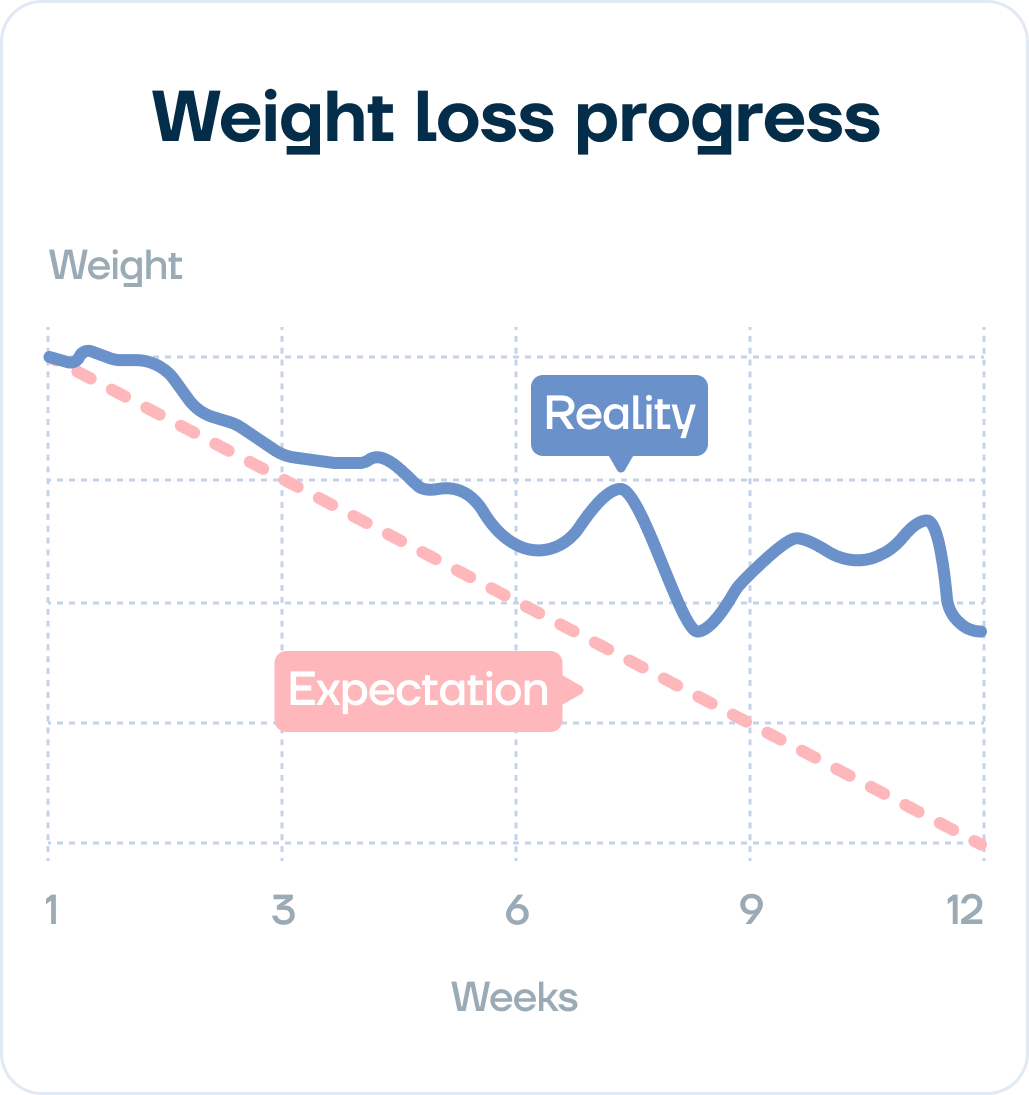Jump to: How do you maximise the results of semaglutide? | 1 – You’re not in a calorie deficit | 2 – You’re in a weight-loss plateau | 3 – Your current dose isn’t high enough to promote lower hunger | Practical strategies | Frequently asked questions | Take home message
The main reasons you’re not losing weight on semaglutide (Wegovy/Ozempic) might be that you’re not eating in a calorie deficit, you’ve hit a weight-loss plateau, or the current dose that you’re on isn’t high enough to lower your hunger to the point where you’re eating less.
In the UK, semaglutide (marketed as Wegovy for weight management and Ozempic for diabetes) has become an increasingly popular treatment option for obesity management, with the NHS introducing specialised services to support eligible patients.
According to NICE guidelines (TA875), semaglutide is approved for weight management in the UK, specifically for individuals with a BMI over 30 with weight-related conditions, or over 35 without such conditions.
Other factors may also contribute to this, such as other medications or health conditions impacting our ability to lose weight.
Not everyone responds to semaglutide (Wegovy) in the same way. A randomised controlled trial involving over 1,900 people living with obesity showed that 7% of participants discontinued their medication due to adverse events and side effects.
Wegovy is a medication that significantly impacts the gastrointestinal tract and directly communicates with the appetite centre in the brain, the hypothalamus.
Unfortunately, some people aren’t able to tolerate these effects and it means they’re unable to continue using the drug.
Additionally, 86.4% of individuals in this study lost at least 5% of their body weight. Still, that means 13.6% of participants lost less than 5%. This means that around 13% of people may be considered ‘non-responders’ to semaglutide.
A weight loss intervention is typically considered successful if participants achieve more than 5-10% of weight loss. So, for some people, semaglutide doesn’t lead to clinically meaningful weight loss for those considered ‘non-responders’.
| Common issues | What’s happening | Solution |
|---|---|---|
| No calorie deficit | Despite reduced hunger, still consuming too many calories | Focus on whole foods rich in protein, fibre, fat, and complex carbohydrates and reduce ultra-processed foods |
| Weight-loss plateau | Body has adapted to weight loss, metabolism slowed | Patience, consistency, possible activity increase, ensure adequate protein |
| Dose too low | Current dose not sufficient to lower hunger enough to support weight loss | Complete titration schedule, wait 4-5 weeks for steady state |
| Medication interactions | Other medications interfering with Wegovy’s effects | Consult healthcare provider about medication timing or adjustments |
| Unrealistic expectations | Expecting faster results than medication can provide | Understand realistic timeline and recommended weight loss rate of 1-2lbs per week |
Medication-assisted weight loss with a future focus
Start with Wegovy or Mounjaro, transition to habit-based health with our support


Individual factors affecting medication response
Our research and clinical experience show that individual factors can significantly influence your results with semaglutide:
- Age and sex: Hormonal differences and age-related metabolic changes can affect medication response
- Medication interactions: Some common medications may reduce effectiveness
- Genetic factors: Variations in GLP-1 receptors can influence how well your body responds
- Starting BMI: Those with higher initial BMIs may see larger absolute weight loss
- Previous weight cycling: A history of yo-yo dieting can affect how our body responds
Semaglutide options available in the UK – 2025 status
| Medication | Drug | Average weight loss | UK approval | NHS availability |
|---|---|---|---|---|
| Wegovy | Semaglutide | 15-17% after 68 weeks | MHRA approved for weight management | Limited NHS availability with specific BMI criteria |
| Ozempic | Semaglutide | 10-15% (when used for weight loss) | MHRA approved for diabetes only | NHS for diabetes only; not approved for weight loss |
How do you maximise the results of semaglutide?
To maximise the results of semaglutide, it’s essential to make positive changes to our diet and lifestyle.
Semaglutide (Wegovy) is only approved for weight loss alongside a lifestyle intervention.
So, there’s no evidence that semaglutide can work sustainably in the long term without us also eating a healthy diet, getting active, and improving our emotional health.
If you’re experiencing side effects that make it difficult to maintain your treatment, learn more about managing common side effects while taking semaglutide.
Now, keep reading as we dig deeper into the three reasons you’re not losing weight on semaglutide.
1) You’re not in a calorie deficit
The evidence is clear: we must eat within a calorie deficit to lose excess body fat. When we eat below our energy balance, our body has to find the energy required to fuel our body’s primary functions by burning excess fat.
Semaglutide works by interacting with the brain’s appetite control centre, the hypothalamus, to lower hunger and food-seeking behaviours.
Research suggests that semaglutide can reduce our energy intake by around 40% compared to individuals not taking semaglutide.
However, we eat for more reasons than physical hunger, and some people might continue to eat enough food that prevents them from achieving a calorie deficit due to psychological, environmental, or habitual reasons.
If you’re still experiencing significant hunger despite medication, you might benefit from our guide on managing hunger signals while on GLP-1 medications.
Additionally, suppose our baseline diet was rich in ultra-processed foods and refined sugars, and we continue to eat this way while on semaglutide. In that case, we may still eat more calories than we need to lose weight.
So, it’s essential we transition to a diet based on whole foods to maximise the results of semaglutide. Try our protein-rich recipes specifically designed for medication users to help you maintain a calorie deficit while feeling satisfied.
Key points:
- We need to eat in a calorie deficit to lose weight
- If our baseline diet is rich in ultra-processed foods and we continue to eat this way on semaglutide, we may still consume more calories than we need to lose weight
- It’s essential to eat a diet based on whole foods to support sustainable weight loss
2) You’re in a weight-loss plateau
Suppose we’ve lost some weight on semaglutide, but then we hit a plateau, and we can’t budge the scales any more. In this case, we’re likely in a weight-loss plateau.
Weight-loss plateaus are extremely common, normal, and a necessary part of the weight-loss process. Being on semaglutide doesn’t prevent us from experiencing weight-loss plateaus.

We have a full guide explaining weight-loss plateaus. However, as a quick summary:
- Our brain receives signals from many hormones, letting it know how much energy we’re eating and how much fat we have stored. We call this the brain’s ‘set point’.
- Weight-loss plateaus occur when our brain senses that we’re consuming fewer calories than normal and our fat stores are decreasing it ‘slows down’ our metabolism
- Evolutionarily, we’re wired to protect fat to ensure survival
- So, weight-loss plateaus are a survival mechanism in the brain to try and protect us from starvation
- Fortunately, we can gradually lower our brain’s set point by continuing to lead a healthy lifestyle and being consistent in our habits
Key points:
- Weight-loss plateaus are a necessary and normal part of the weight-loss process. Semaglutide doesn’t prevent weight-loss plateaus from occurring.
- Weight-loss plateaus occur when our brain senses we’re losing fat and eating less, so it slows down our metabolism to protect our remaining fat stores
- We can overcome weight-loss plateaus by being consistent with our healthy habits
3) Your current dose isn’t high enough to promote lower hunger
Semaglutide reduces appetite and hunger, helping you eat fewer calories; this effect is almost immediate when you start Wegovy.
However, you might notice the effect of lower hunger wearing off after 4-5 days post-injection in the first month of taking Wegovy.
It can take 4-5 weeks for Ozempic to reach a level in the body we call a steady state. A steady state is when the drug’s levels in the body remain consistent rather than spiking and falling.
Interestingly, this initial weight loss is no different to other weight loss treatments or the impact of diet interventions on weight loss. The real effect of semaglutide is seen beyond three months.
Semaglutide is a long-acting medication that’s started at a lower dose to reduce the number and severity of side effects as it’s built up to a higher maintenance dose.
Additionally, we might find that our body adapts to the lower doses, and hunger can increase. However, we might find this reverses when we move up a dose.
If you’re considering whether semaglutide is right for you, you might want to find out if you meet the NHS criteria for semaglutide prescription.
Key points:
- The lower doses of semaglutide can wear off after 4-5 days
- It can take up to 4-5 weeks for the medication to reach a ‘steady state’ where its levels are consistent in the blood
- Weight loss may be steady at the beginning but become more consistent as you increase your dose
Practical strategies to enhance semaglutide results in the UK
Nutrition tips
- Prioritise protein at every meal (aim for 1.6-2g per kg of body weight daily)
- Stay well-hydrated (2-3 litres daily) to manage common side effects
- Consider splitting meals into smaller, more frequent portions if you feel full quickly
- Limit ultra-processed foods which may trigger cravings despite medication
Physical activity guidance
- Include resistance training 2-3 times weekly to preserve muscle mass
- Aim to move a little bit each day, even a 5 minute walk as developing the habit of movement is more important than rigid targets when first starting
- Try exercise snacking, like calf raises when the kettle is boiling, or push-ups when you’ve been to the toilet
Planning for the future
- Develop strategies for maintaining weight loss after treatment
- Learn how to safely transition off semaglutide when the time comes
Frequently asked questions
How do I access semaglutide on the NHS in the UK?
NHS access to semaglutide requires meeting specific eligibility criteria established by NICE. For Wegovy (semaglutide), you typically need a BMI of 35+ or 30+ with weight-related conditions.
Your GP can refer you to an NHS weight management service, which may then prescribe the medication if you meet the criteria and have previously tried lifestyle interventions.
According to NHS England, availability varies by region, with specialised weight management services gradually expanding throughout 2025.
Why has my weight loss on semaglutide slowed down or stopped?
Weight loss plateaus on semaglutide are normal and expected. Your body naturally adapts to weight loss by reducing energy expenditure (adaptive thermogenesis).
Additionally, as you lose weight, you require fewer calories for maintenance. To overcome plateaus, ensure you’re adjusting your calorie intake downward as you lose weight, increase physical activity (particularly strength training), and maintain consistency with your medication schedule. If plateaus persist beyond 4-6 weeks, consult your healthcare provider.
How long should I try semaglutide before deciding if it works for me?
UK healthcare providers typically recommend giving semaglutide at least 3-6 months at the appropriate dose before determining effectiveness.
The full weight loss benefits typically emerge after reaching the maintenance dose (2.4 mg for Wegovy) and continuing treatment for several months.
NICE guidelines suggest reassessing after 6 months, with continued prescription only if you’ve lost at least 5% of your starting weight.
Why do some people not respond to semaglutide in the UK?
Approximately 10-20% of people don’t achieve significant weight loss on semaglutide due to genetic factors, medication interactions, or hormonal differences.
Research shows variations in GLP-1 receptors can affect how well your body responds to the medication. Additionally, certain medications, such as some steroids and antidepressants, may reduce effectiveness.
Your GP can help determine if another approach might be more suitable if you’re experiencing challenges with semaglutide effectiveness.
Can I take semaglutide without lifestyle changes and still lose weight?
While semaglutide can cause weight loss without lifestyle changes, NICE guidelines specify it should be used alongside diet and exercise modifications.
Clinical data shows combining semaglutide with lifestyle changes results in greater weight loss than medication alone.
Additionally, NHS prescribing criteria require participation in lifestyle intervention as part of the treatment protocol.
Take home message
As we’ve covered in this article, there are many reasons why you might not be losing weight on semaglutide. For many of us, there’s likely a way of maximising our results on semaglutide to kickstart our weight loss.
However, a small percentage (~10-20%) of individuals are unlikely to respond well to the medication for various reasons.
If you’re currently on semaglutide and are unsure why the medication isn’t having the desired effect, we’d recommend speaking with your GP or NHS weight management service if you’re based in the UK, or consult your local healthcare provider if outside the UK.
If you’re looking for support on your weight loss journey with semaglutide, learn how Second Nature compares to other providers of medication-supported weight management.
Second Nature's Mounjaro and Wegovy programmes
Second Nature provides Mounjaro or Wegovy as part of our Mounjaro and Wegovy weight-loss programmes.
Why choose Second Nature over other medication providers, assuming you're eligible?
Because peace of mind matters.
We've had the privilege of working with the NHS for over eight years, helping people across the UK take meaningful steps toward a healthier, happier life.
Our programmes are designed to meet people where they are, whether that means support with weight loss through compassionate one-to-one health coaching, or access to the latest weight-loss medications (like Mounjaro and Wegovy) delivered alongside expert care from a multidisciplinary team of doctors, psychologists, dietitians, and personal trainers.
At the heart of everything we do is a simple belief: real, lasting change comes from building better habits, not relying on quick fixes. We're here to support that change every step of the way.
With over a decade of experience, thousands of lives changed, and a long-standing record of delivering programmes used by the NHS, we believe we're the UK's most trusted weight-loss programme.
We hope to offer you something invaluable: peace of mind, and the support you need to take that first step.
References
- National Institute for Health and Care Excellence. (2022). Semaglutide for managing overweight and obesity (TA875)
- Wilding JPH, Batterham RL, Calanna S, et al. (2021). Once-Weekly Semaglutide in Adults with Overweight or Obesity. N Engl J Med, 384(11):989-1002.
- Blundell J, Finlayson G, Axelsen M, et al. (2017). Effects of once-weekly semaglutide on appetite, energy intake, control of eating, food preference and body weight in subjects with obesity. Diabetes Obes Metab, 19(9):1242-1251.
- NHS England. (2025). Weight Loss Treatments Information
- Richards, R., et al. (2025). A Remotely Delivered, Semaglutide-Supported Weight Management Program: 12-Month Outcomes From a Retrospective Service Evaluation. JMIR Formative Research, 9(1), e72577.


